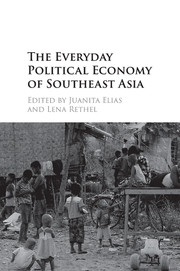Book contents
- Frontmatter
- Epigraph
- Contents
- List of Figures and Map
- List of Tables
- Notes on Contributors
- Acknowledgements
- Part I Introduction
- Part II From Development to Multiple Modernities
- Part III Widening and Deepening Markets
- Part IV People, Mobilities and Work
- 8 From Formal Employment to Street Vending: Malaysian Women's Labour Force Participation over the Life Course
- 9 Everyday Identities in Motion: Situating Malaysians within the ‘War for Talent’
- 10 Regional Disputes over the Transnationalization of Domestic Labour: Malaysia's ‘Maid Shortage’ and Foreign Relations with Indonesia and Cambodia
- 11 Enforcing Socioeconomic Rights: Everyday Agency, Resistance and Community Resources among Indonesian Migrant Domestic Workers in Hong Kong
- Part V Conclusion
- Index
- References
9 - Everyday Identities in Motion: Situating Malaysians within the ‘War for Talent’
from Part IV - People, Mobilities and Work
Published online by Cambridge University Press: 05 August 2016
- Frontmatter
- Epigraph
- Contents
- List of Figures and Map
- List of Tables
- Notes on Contributors
- Acknowledgements
- Part I Introduction
- Part II From Development to Multiple Modernities
- Part III Widening and Deepening Markets
- Part IV People, Mobilities and Work
- 8 From Formal Employment to Street Vending: Malaysian Women's Labour Force Participation over the Life Course
- 9 Everyday Identities in Motion: Situating Malaysians within the ‘War for Talent’
- 10 Regional Disputes over the Transnationalization of Domestic Labour: Malaysia's ‘Maid Shortage’ and Foreign Relations with Indonesia and Cambodia
- 11 Enforcing Socioeconomic Rights: Everyday Agency, Resistance and Community Resources among Indonesian Migrant Domestic Workers in Hong Kong
- Part V Conclusion
- Index
- References
Summary
Introduction
Southeast Asian elites seeking to manage complex processes of political and economic transition as part of the desire to build and sustain national economic competitiveness are increasingly preoccupied with the issue of talent. The cultivation and retention of skilled workers, innovative entrepreneurs and corporate protégés is considered essential for countries seeking to maximize their regional comparative advantage. Talented individuals are expected to use their metacognitive skills and influence to contribute to national development and, by extension, enhance the performance legitimacy of the regime in power. This chapter draws on evidence from Malaysia in order to examine the disjuncture between state efforts to cultivate and retain talent, and the ways in which people interpret and respond to heavily instrumentalist talent enhancement projects. The Everyday Political Economy approach adopted here looks beyond broad determinants of the brain drain, focusing instead on the critical nuances – specifically pertaining to identity politics − that help explain why individuals emigrate and how talent initiatives become enmeshed with politicized expressions of power.
The country's recent economic transformation plans have focused on the need to propel Malaysia towards high-income country status, creating a knowledge economy infused with entrepreneurial spirit and producing, no less, a new generation of geniuses and Nobel laureates. To this end, private as well as state-owned enterprises are said to be embroiled in a global ‘war for talent’ (EIU 2011). This now highly globalized narrative posits that the war can only be ‘won’ if companies and governments affirm the worth of each individual employee and citizen while at the same time investing differentially in them in order to maximize their potential (Thrift 2010: 199). Comprehensive policies designed to achieve this goal, such as the Tenth Malaysia Plan (2011–15) and the Economic Transformation Programme (2010) are at odds, however, with Malaysia's conservative and reactionary politics, where the language of ketuanan Melayu (Malay supremacy) has entered the mainstream and the politics of ethnoreligious insult has become routinized in order to preserve the ruling party status of the United Malays National Organization (UMNO). As a consequence, government efforts to retain and recapture Malaysian talent – considered so vital for economic transformation – are faltering.
- Type
- Chapter
- Information
- The Everyday Political Economy of Southeast Asia , pp. 178 - 195Publisher: Cambridge University PressPrint publication year: 2016

